
Safeguarding and Child Protection
Our Safeguarding Team
Safeguarding Team
.jpg)
Mrs Ham
Designated Safeguarding Lead
.jpg)
Mrs Wilkinson
Deputy Designated Safeguarding Lead
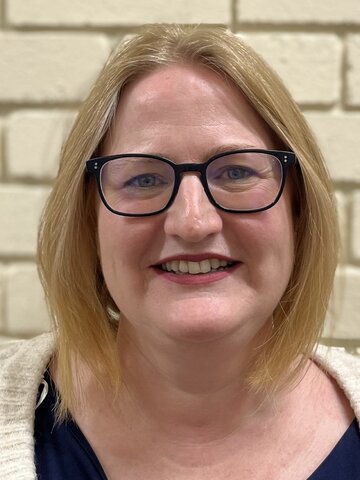
Mrs Watson
Governor Safeguarding Lead
At St Barnabas, the safeguarding of our children is the highest priority.
Safeguarding Policies

Safeguarding Children is Everybody's Responsibility
Safeguarding and promoting the welfare of children is defined as: protecting children from maltreatment; preventing impairment of children’s health or development; ensuring that children grow up in circumstances consistent with the provision of safe and effective care; and taking action to enable all children to have the best outcomes.
Are you concerned that a child is being abused or neglected?
If you are concerned about a child and you feel they are being abused, neglected or at risk of abuse/neglect, then you should consider making a safeguarding child referral.
Contact Blackburn with Darwen Multi-Agency Safeguarding Hub (MASH) for confidential advice and consultation. Monday to Friday 08.45-17.00 please call:
01254 666400
If you are calling outside these hours please contact our Emergency Duty Team on 01254 587547.
You can contact the Blackburn with Darwen Local Safeguarding Children Board by following this link:

http://www.lscb.org.uk
You can also report your concerns online:
NSPCC Website: www.nspcc.org.uk
Or you can also speak to:
NSPCC 0800 800 5000
Childline 0800 1111

Our school is part of Operation Encompass.
Operation Encompass is a national police and education early intervention safeguarding partnership which supports children and young people who experience Domestic Violence and Abuse and which is in place in every police force in England and Wales.
Children were recognised as victims of domestic abuse in their own right in the 2021 Domestic Abuse Act.
Operation Encompass means that the police will share information with our school about all police attended Domestic Abuse incidents which involve any of our children PRIOR to the start of the next school day.
Once a Key Adult (DSL) and their deputy/ies (DDSLs) have attended either an Operation Encompass briefing or completed the online Operation Encompass Key Adult training they will cascade the principles of Operation Encompass to all other school staff and Governors. All schools staff and Governors can undertake the online training.
Our DSL undertook recent Operation Encompass training on 07/02/22
Our Deputy DSL undertook recent Operation Encompass training on 10/02/22
The Operation Encompass information is stored in line with all other confidential safeguarding and child protection information.
As a staff we have discussed how we can support our children who are experiencing Domestic Violence and Abuse on a day-to-day basis and particularly following the Operation Encompass notification. We have used the Operation Encompass Handbooks to inform our thinking.
We are aware that we must do nothing that puts the child/ren or the non-abusing adult at risk.

Operation Encompass Documents
Support and resources for children and parents
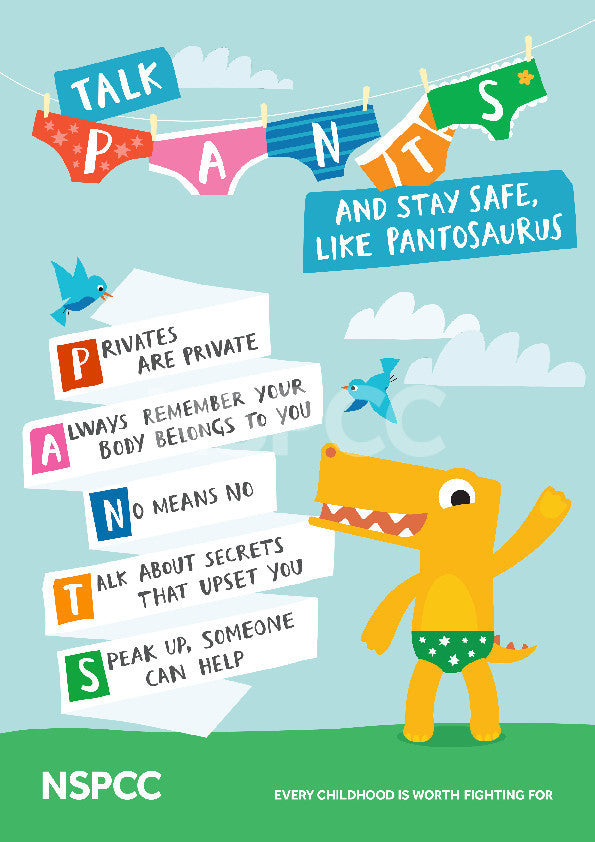
NSPCC - https://www.nspcc.org.uk/keeping-children-safe/support-for-parents/
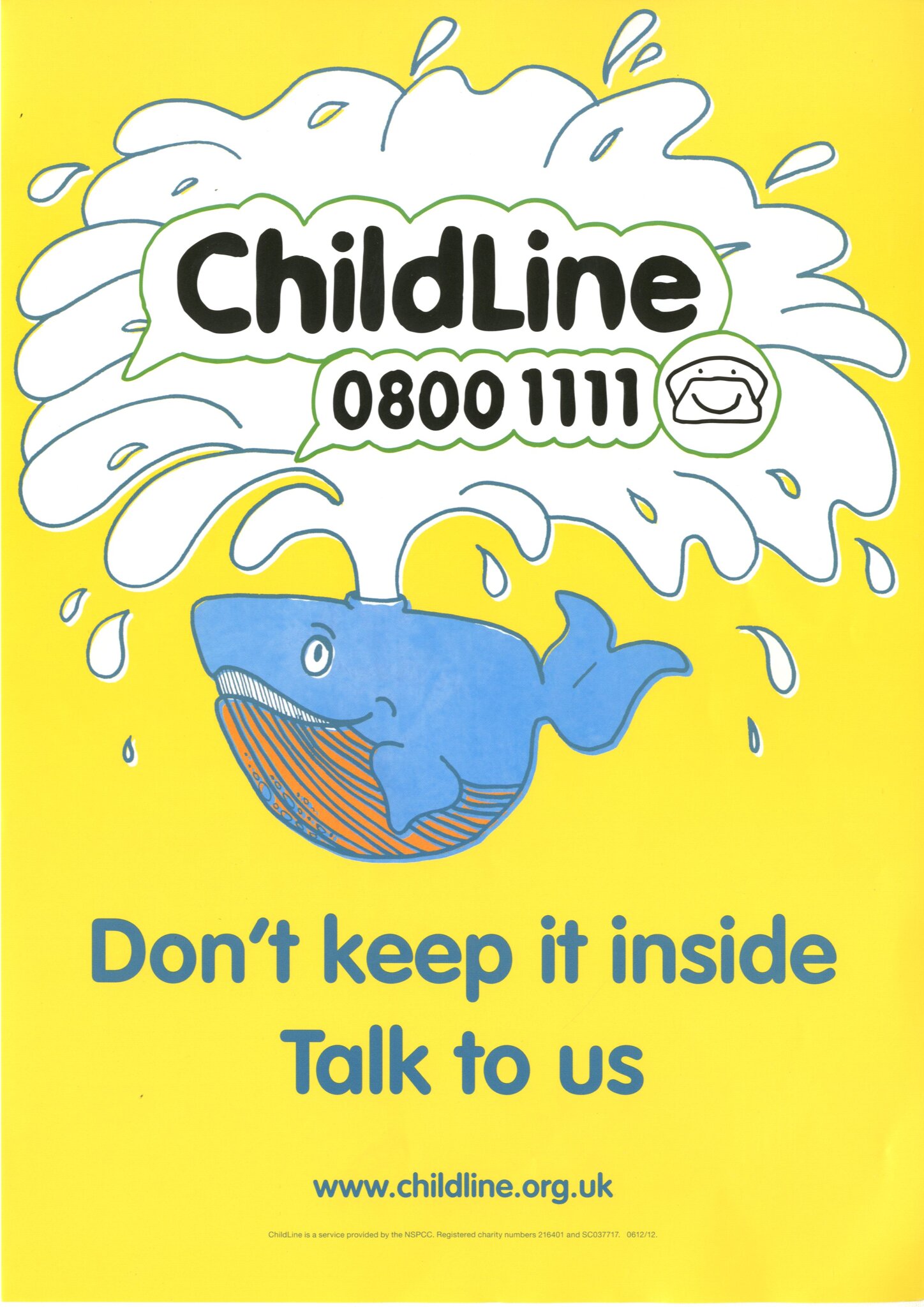
Childline- https://www.childline.org.uk/
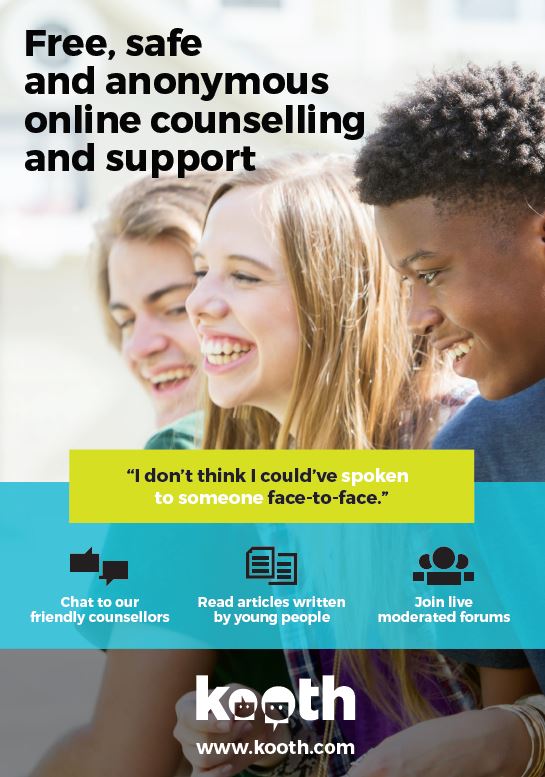
Kooth- https://www.kooth.com/
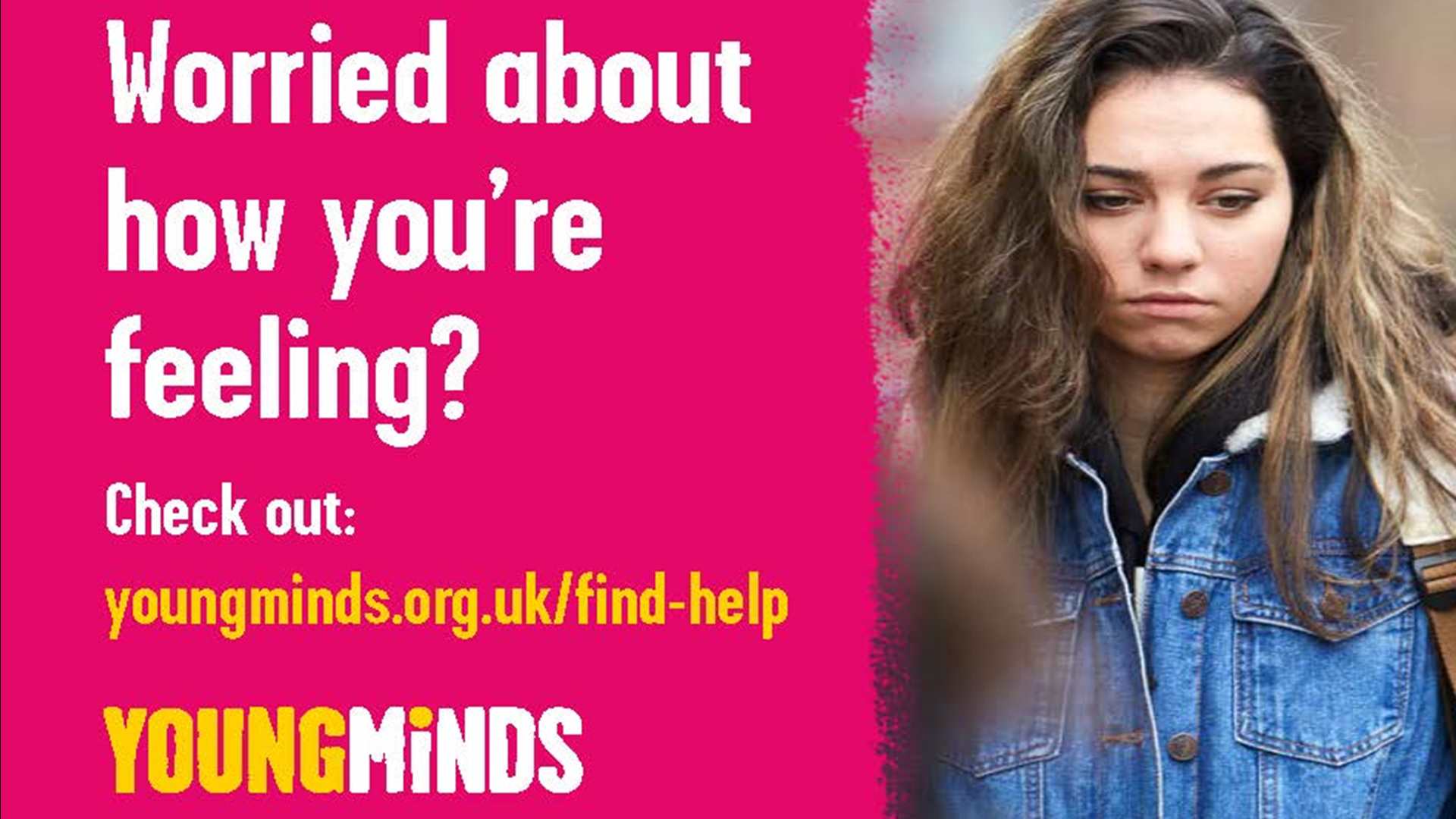
Young Minds- https://www.youngminds.org.uk/
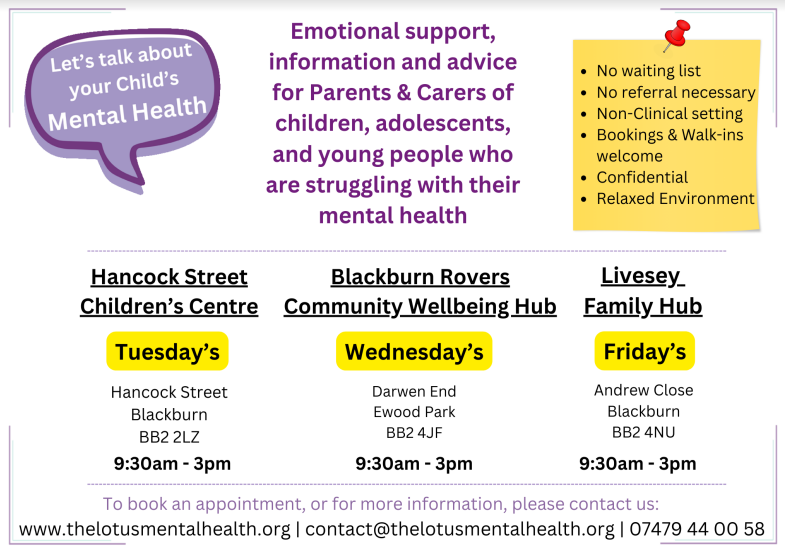
Bee Yourself-
Bee Yourself is an online platform designed to promote mental health and wellbeing for young people living in Blackburn with Darwen. It offers a range of resources and activities to help young people feel good and have fun while providing information and support for parents, carers, and practitioners working with young people.
https://getstuckin.org.uk/bee-yourself/
Teen Mental Health- A guide for parents-
https://www.mytutor.co.uk/blog/parents/teen-mental-health-a-guide-for-parents/
Menstrual cycles and mental health- A guide for parents-
https://yoppie.com/menstrual-cycles-mental-health
The Lily-Jo Project- mental health support for children advice for parents
Drug and alcohol support- Rehab 4 addiction
https://www.rehab4addiction.co.uk/country-wide/drug-alcohol-rehab-lancashire
Mental health and wellbeing support
Safeguarding guides and support for parents

Early Help
Blackburn with Darwen Early Help Offer.
Early help, also known as early intervention, is support given to a family when a problem first emerges. It can be provided at any stage in a child or young person's life.
Early help services can be delivered to parents, children or whole families, but their main focus is to improve outcomes for children. For example, services may help parents who are living in challenging circumstances provide a safe and loving environment for their child. Or, if a child is displaying risk-taking behaviour, early help practitioners might work with the child and their parents to find out the reasons for the child's behaviour and put strategies in place to help keep them safe.
Providing timely support is vital. Addressing a child or family's needs early on can reduce risk factors and increase protective factors in a child's life.
Protective factors can reduce risk to a child's wellbeing. They include:
-
developing strong social and emotional skills
-
having a strong social support network for the family – including support
-
for good parental mental health
-
income support, benefits and advice
-
good community services and facilities
Early help can offer children the support needed to reach their full potential (EIF, 2021). It can improve the quality of a child’s home and family life, enable them to perform better at school and support their mental health (EIF, 2021).
Research suggests that early help can:
-
protect children from harm
-
reduce the need for a referral to child protection services
-
improve children's long-term outcomes
What is a Child and Family (CAF) Assessment?
The CAF Assessment is a way of working with children and young people. It involves listening to you and your child to find out your child’s needs, and what is working well in your child’s life. An action plan, agreed with you and your child, is also put in place to make sure your child gets the right sort of help.
How will CAF Assessment help my family?
The CAF Assessment exists to help you support your child. It can lead to a quick solution or help to identify extra support if needed. The CAF assessment will ensure that everyone involved with your child – such as teachers and health visitors – works together to support your child. The CAF Assessment will help your child receive the right support at an early stage before their needs increase which can be much more difficult to help you with.
When is The CAF Assessment used?
The CAF Assessment can be used if you or someone who works with your child would like your child to receive extra support. It will help to identify your child’s additional needs, and other workers required to support your family.
The Child & Family Assessment [CAF] is a four-step process whereby practitioners can;
•identify a child’s or young persons needs early
•assess those needs holistically
•deliver co-ordinated services
•review progress
The CAF is designed to be used when:a practitioner is worried about how well a child or young person is progressing, e.g. concerns about their health, development, welfare, behaviour, progress in learning or any other aspect of their wellbeing
-
a child or young person, or their parent/carer, raises a concern with a practitioner
-
a child's or young person's needs are unclear, or broader than the practitioner's service can address.
-
The process is entirely voluntary and informed consent is mandatory, so families do not have to engage - if they do, they can choose what information they want to share. Children and families should not feel stigmatised by the CAF; they can ask for a CAF to be initiated.
The CAF should be offered to children who have additional needs to those being met by universal services. Unless a child is presenting a need, it is unlikely the CAF will be offered. The practitioner assesses needs using the CAF. The CAF is not a risk assessment.
If a child or young person reveals they are at risk, the practitioner should follow the local safeguarding process immediately.
How does it work?
With agreement a professional will ask you and your child some questions to find out what help and support your child might need. This information is recorded on a CAF simple form. You and your child will agree what is put on the form, and you will be given a copy of it.
Older children may feel able to discuss their situation on their own with the worker. A young person’s wish to keep information confidential from parents may be respected by the worker, where this is in the young person’s best interests and welfare.
Confidentiality
As a rule the information which you and your child provide will only be shared with your family’s consent. However there may be certain times when the people working with you need to share information.
For example:
• When they need to find out urgently if a child is at risk of harm;
• To help a child who is at risk of harm;
• When an adult is at risk of harm; or
• To help prevent or detect a serious crime.
Who is a co-ordinator?
If an CAF Assessment is to be completed, you will choose who you would like to be the lead practitioner. This person will keep you informed, listen to your views and support you. The lead practitioner will also co-ordinate all the services supporting your child. At St Barnabas, our lead practitioners tend to be a member of the Safeguarding Team.
For further information please see the link to the local offer:
https://www.bwd-localoffer.org.uk/kb5/blackburn/directory/advice.page;jsessionid=C63ECCD6644F37BE368C1B39FF8C2DD0?id=AH4TiHxgriI
Early Help Services

Prevent information
At St Barnabas we recognise that we must have “due regard to the need to prevent people from being drawn into terrorism”. This duty is known as the Prevent duty and enables us to protect children from the risk of radicalisation.
“In order for schools and childcare providers to fulfil the Prevent duty, it is essential that staff are able to identify children who may be vulnerable to radicalisation, and know what to do when they are identified. Protecting children from the risk of radicalisation should be seen as part of schools’ and childcare providers’ wider safeguarding duties, and is similar in nature to protecting children from other harms (e.g. drugs, gangs, neglect, sexual exploitation), whether these come from within their family or are the product of outside influences. Schools and childcare providers can also build pupils’ resilience to radicalisation by promoting fundamental British values and enabling them to challenge extremist views. It is important to emphasise that the Prevent duty is not intended to stop pupils debating controversial issues. On the contrary, schools should provide a safe space in which children, young people and staff can understand the risks associated with terrorism and develop the knowledge and skills to be able to challenge extremist arguments.
(Prevent Duty, June 2015)
As part of our wider safeguarding duties, at St Barnabas we recognise that it is essential that we are able to identify children who may be vulnerable to radicalisation, and know what to do when they are identified. All relevant staff undertake online CPD provided by the Home Office on identification of children vulnerable to radicalisation and the PREVENT strategy or face to face PREVENT training every two years. Updates are provided through team meetings and briefings sharing relevant government updates and case studies.


Staff are aware of potential indicators that children are vulnerable to radicalisation regardless of age, gender, ethnicity etc. As a result, they are alert to changes in children’s behaviour which could indicate that they may be in need of help or protection. Children at risk of radicalisation may display different signs or seek to hide their views. School staff use their professional judgement in identifying children who might be at risk of radicalisation and act proportionately. School staff report any concerns and, through discussion with the safeguarding team, understand when it is appropriate to make a referral to the Channel programme.
Channel is a multi-agency safeguarding programme run in every local authority in England and Wales.
It works to support vulnerable people from being drawn into terrorism and provides a range of support such as mentoring, counselling, assistance with employment etc. Channel is about early intervention to protect vulnerable people from being drawn into committing terrorist-related activity and addresses all types of extremism.
Participation in Channel is voluntary. It is up to an individual, or their parents for children aged 17 and under, to decide whether to take up the support it offers. Channel does not lead to a criminal record.
If you have any concerns about someone and would like more advice ring:
-
Local Authority Prevent team: 01254 585 260 / email [email protected]
-
Police Prevent Team: 01772 413398
-
If you think a threat is imminent call the police on 999
-
Alternatively contact the police confidentially on the Anti-terrorist hotline 0800 789 321.
-
Report your concerns to [email protected].
Any information, advice or concern will be handled with sensitivity and where possible anonymity will be maintained. Referrals can be made directly to the email inbox by any individual or organisation and will be dealt with discretion.
Safeguarding and Child Protection
Our Safeguarding Team
Safeguarding Team
.jpg)
Mrs Ham
Designated Safeguarding Lead
.jpg)
Mrs Wilkinson
Deputy Designated Safeguarding Lead

Mrs Watson
Governor Safeguarding Lead
At St Barnabas, the safeguarding of our children is the highest priority.
Safeguarding Policies

Safeguarding Children is Everybody's Responsibility
Safeguarding and promoting the welfare of children is defined as: protecting children from maltreatment; preventing impairment of children’s health or development; ensuring that children grow up in circumstances consistent with the provision of safe and effective care; and taking action to enable all children to have the best outcomes.
Are you concerned that a child is being abused or neglected?
If you are concerned about a child and you feel they are being abused, neglected or at risk of abuse/neglect, then you should consider making a safeguarding child referral.
Contact Blackburn with Darwen Multi-Agency Safeguarding Hub (MASH) for confidential advice and consultation. Monday to Friday 08.45-17.00 please call:
01254 666400
If you are calling outside these hours please contact our Emergency Duty Team on 01254 587547.
You can contact the Blackburn with Darwen Local Safeguarding Children Board by following this link:
http://www.lscb.org.uk
You can also report your concerns online:
NSPCC Website: www.nspcc.org.uk
Or you can also speak to:
NSPCC 0800 800 5000
Childline 0800 1111

Our school is part of Operation Encompass.
Operation Encompass is a national police and education early intervention safeguarding partnership which supports children and young people who experience Domestic Violence and Abuse and which is in place in every police force in England and Wales.
Children were recognised as victims of domestic abuse in their own right in the 2021 Domestic Abuse Act.
Operation Encompass means that the police will share information with our school about all police attended Domestic Abuse incidents which involve any of our children PRIOR to the start of the next school day.
Once a Key Adult (DSL) and their deputy/ies (DDSLs) have attended either an Operation Encompass briefing or completed the online Operation Encompass Key Adult training they will cascade the principles of Operation Encompass to all other school staff and Governors. All schools staff and Governors can undertake the online training.
Our DSL undertook recent Operation Encompass training on 07/02/22
Our Deputy DSL undertook recent Operation Encompass training on 10/02/22
The Operation Encompass information is stored in line with all other confidential safeguarding and child protection information.
As a staff we have discussed how we can support our children who are experiencing Domestic Violence and Abuse on a day-to-day basis and particularly following the Operation Encompass notification. We have used the Operation Encompass Handbooks to inform our thinking.
We are aware that we must do nothing that puts the child/ren or the non-abusing adult at risk.
Operation Encompass Documents
Support and resources for children and parents

NSPCC - https://www.nspcc.org.uk/keeping-children-safe/support-for-parents/

Childline- https://www.childline.org.uk/

Kooth- https://www.kooth.com/

Young Minds- https://www.youngminds.org.uk/
Bee Yourself-
Bee Yourself is an online platform designed to promote mental health and wellbeing for young people living in Blackburn with Darwen. It offers a range of resources and activities to help young people feel good and have fun while providing information and support for parents, carers, and practitioners working with young people.
https://getstuckin.org.uk/bee-yourself/
Teen Mental Health- A guide for parents-
https://www.mytutor.co.uk/blog/parents/teen-mental-health-a-guide-for-parents/
Menstrual cycles and mental health- A guide for parents-
https://yoppie.com/menstrual-cycles-mental-health
The Lily-Jo Project- mental health support for children advice for parents
Drug and alcohol support- Rehab 4 addiction
https://www.rehab4addiction.co.uk/country-wide/drug-alcohol-rehab-lancashire
Mental health and wellbeing support
Safeguarding guides and support for parents
Early Help
Blackburn with Darwen Early Help Offer.
Early help, also known as early intervention, is support given to a family when a problem first emerges. It can be provided at any stage in a child or young person's life.
Early help services can be delivered to parents, children or whole families, but their main focus is to improve outcomes for children. For example, services may help parents who are living in challenging circumstances provide a safe and loving environment for their child. Or, if a child is displaying risk-taking behaviour, early help practitioners might work with the child and their parents to find out the reasons for the child's behaviour and put strategies in place to help keep them safe.
Providing timely support is vital. Addressing a child or family's needs early on can reduce risk factors and increase protective factors in a child's life.
Protective factors can reduce risk to a child's wellbeing. They include:
-
developing strong social and emotional skills
-
having a strong social support network for the family – including support
-
for good parental mental health
-
income support, benefits and advice
-
good community services and facilities
Early help can offer children the support needed to reach their full potential (EIF, 2021). It can improve the quality of a child’s home and family life, enable them to perform better at school and support their mental health (EIF, 2021).
Research suggests that early help can:
-
protect children from harm
-
reduce the need for a referral to child protection services
-
improve children's long-term outcomes
What is a Child and Family (CAF) Assessment?
The CAF Assessment is a way of working with children and young people. It involves listening to you and your child to find out your child’s needs, and what is working well in your child’s life. An action plan, agreed with you and your child, is also put in place to make sure your child gets the right sort of help.
How will CAF Assessment help my family?
The CAF Assessment exists to help you support your child. It can lead to a quick solution or help to identify extra support if needed. The CAF assessment will ensure that everyone involved with your child – such as teachers and health visitors – works together to support your child. The CAF Assessment will help your child receive the right support at an early stage before their needs increase which can be much more difficult to help you with.
When is The CAF Assessment used?
The CAF Assessment can be used if you or someone who works with your child would like your child to receive extra support. It will help to identify your child’s additional needs, and other workers required to support your family.
The Child & Family Assessment [CAF] is a four-step process whereby practitioners can;
•identify a child’s or young persons needs early
•assess those needs holistically
•deliver co-ordinated services
•review progress
The CAF is designed to be used when:a practitioner is worried about how well a child or young person is progressing, e.g. concerns about their health, development, welfare, behaviour, progress in learning or any other aspect of their wellbeing
-
a child or young person, or their parent/carer, raises a concern with a practitioner
-
a child's or young person's needs are unclear, or broader than the practitioner's service can address.
-
The process is entirely voluntary and informed consent is mandatory, so families do not have to engage - if they do, they can choose what information they want to share. Children and families should not feel stigmatised by the CAF; they can ask for a CAF to be initiated.
The CAF should be offered to children who have additional needs to those being met by universal services. Unless a child is presenting a need, it is unlikely the CAF will be offered. The practitioner assesses needs using the CAF. The CAF is not a risk assessment.
If a child or young person reveals they are at risk, the practitioner should follow the local safeguarding process immediately.
How does it work?
With agreement a professional will ask you and your child some questions to find out what help and support your child might need. This information is recorded on a CAF simple form. You and your child will agree what is put on the form, and you will be given a copy of it.
Older children may feel able to discuss their situation on their own with the worker. A young person’s wish to keep information confidential from parents may be respected by the worker, where this is in the young person’s best interests and welfare.
Confidentiality
As a rule the information which you and your child provide will only be shared with your family’s consent. However there may be certain times when the people working with you need to share information.
For example:
• When they need to find out urgently if a child is at risk of harm;
• To help a child who is at risk of harm;
• When an adult is at risk of harm; or
• To help prevent or detect a serious crime.
Who is a co-ordinator?
If an CAF Assessment is to be completed, you will choose who you would like to be the lead practitioner. This person will keep you informed, listen to your views and support you. The lead practitioner will also co-ordinate all the services supporting your child. At St Barnabas, our lead practitioners tend to be a member of the Safeguarding Team.
For further information please see the link to the local offer:
https://www.bwd-localoffer.org.uk/kb5/blackburn/directory/advice.page;jsessionid=C63ECCD6644F37BE368C1B39FF8C2DD0?id=AH4TiHxgriI
Early Help Services
Prevent information
At St Barnabas we recognise that we must have “due regard to the need to prevent people from being drawn into terrorism”. This duty is known as the Prevent duty and enables us to protect children from the risk of radicalisation.
“In order for schools and childcare providers to fulfil the Prevent duty, it is essential that staff are able to identify children who may be vulnerable to radicalisation, and know what to do when they are identified. Protecting children from the risk of radicalisation should be seen as part of schools’ and childcare providers’ wider safeguarding duties, and is similar in nature to protecting children from other harms (e.g. drugs, gangs, neglect, sexual exploitation), whether these come from within their family or are the product of outside influences. Schools and childcare providers can also build pupils’ resilience to radicalisation by promoting fundamental British values and enabling them to challenge extremist views. It is important to emphasise that the Prevent duty is not intended to stop pupils debating controversial issues. On the contrary, schools should provide a safe space in which children, young people and staff can understand the risks associated with terrorism and develop the knowledge and skills to be able to challenge extremist arguments.
(Prevent Duty, June 2015)
As part of our wider safeguarding duties, at St Barnabas we recognise that it is essential that we are able to identify children who may be vulnerable to radicalisation, and know what to do when they are identified. All relevant staff undertake online CPD provided by the Home Office on identification of children vulnerable to radicalisation and the PREVENT strategy or face to face PREVENT training every two years. Updates are provided through team meetings and briefings sharing relevant government updates and case studies.

Staff are aware of potential indicators that children are vulnerable to radicalisation regardless of age, gender, ethnicity etc. As a result, they are alert to changes in children’s behaviour which could indicate that they may be in need of help or protection. Children at risk of radicalisation may display different signs or seek to hide their views. School staff use their professional judgement in identifying children who might be at risk of radicalisation and act proportionately. School staff report any concerns and, through discussion with the safeguarding team, understand when it is appropriate to make a referral to the Channel programme.
Channel is a multi-agency safeguarding programme run in every local authority in England and Wales.
It works to support vulnerable people from being drawn into terrorism and provides a range of support such as mentoring, counselling, assistance with employment etc. Channel is about early intervention to protect vulnerable people from being drawn into committing terrorist-related activity and addresses all types of extremism.
Participation in Channel is voluntary. It is up to an individual, or their parents for children aged 17 and under, to decide whether to take up the support it offers. Channel does not lead to a criminal record.
If you have any concerns about someone and would like more advice ring:
-
Local Authority Prevent team: 01254 585 260 / email [email protected]
-
Police Prevent Team: 01772 413398
-
If you think a threat is imminent call the police on 999
-
Alternatively contact the police confidentially on the Anti-terrorist hotline 0800 789 321.
-
Report your concerns to [email protected].
Any information, advice or concern will be handled with sensitivity and where possible anonymity will be maintained. Referrals can be made directly to the email inbox by any individual or organisation and will be dealt with discretion.